Viktor Pfeifer: "You shouldn't take anything for granted"
ÂMay 30, 2010
By Reut Golinsky, Tatiana Geikhman
Photo © Reut Golinsky, Absolute Skating
Special thanks to Tanya Drubetskaya for the help with the transcript.
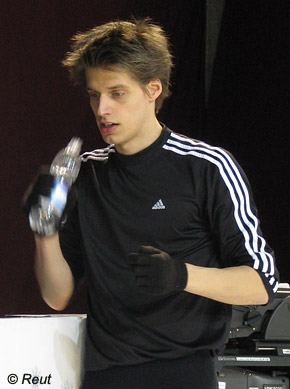 Four years ago, before the previous Olympic Games, Absolute Skating had a chat with Victor Pfeifer, the leading Austrian skater. One Olympic cycle later and armed with a printout of the article, we came back to him for an update trying to compare and understand what had changed since 2006. With the perspective of what has happened during those four years, it was really interesting to reread that interview now. In between there were ups and downs, broken hopes and in the end "reinvention".
Four years ago, before the previous Olympic Games, Absolute Skating had a chat with Victor Pfeifer, the leading Austrian skater. One Olympic cycle later and armed with a printout of the article, we came back to him for an update trying to compare and understand what had changed since 2006. With the perspective of what has happened during those four years, it was really interesting to reread that interview now. In between there were ups and downs, broken hopes and in the end "reinvention".
A major change in your life was your move to the US. How did it come about?
After the Olympics [Turin 2006] I decided that the next thing for me was to go to the United States, to work there and get better training opportunities. Elena Romanova is an amazing coach, she's helped me so much over the years, but I decided to leave. Unfortunately the new coaching choice didn't work out for me, and things were complicated and hard anyway. I was 18 years old and still had some growing up to do, I was alone in the United States and the environment was just wrong for me. I started getting into the skating skills and dancing, but I didn't jump anymore. I was willing to do anything to be successful but I guess I wasn't doing the right things, so things went downhill...
As for the issues with the Austrian federation, they weren't that bad. The Federation wasn't actually fighting with me, they just didn't agree with my training in the US. I took offence to it for some reason.
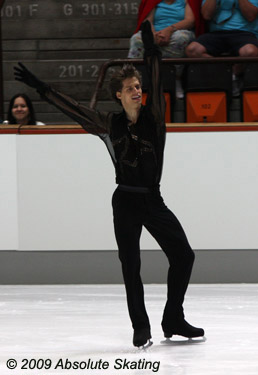 And then you decided not to skate for Austria anymore...
And then you decided not to skate for Austria anymore...
It was more like not skating at all. My decision was not for the United States, or even against Austria, it was more - probably subconsciously and now I can admit to it - against skating in general. I loved skating, I wanted to skate, I trained all day long, but I was not competitive any more and I think that subconsciously I did not want to be seen in the shape I was in. Does it make sense? I didn't think I was even close to good enough to competing at an international level and I didn't want to compete in the shape I was in.
During the 2007/2008 season you tried to compete in American competitions, but you didn't make it to Nationals.
Yeah. I did Regionals and they were OK, I pulled off a piece of the program. But then I didn't work on jumps for two months, but still competed at Sectionals. I think I nailed one triple then.
In December 2007 after I left my coach, I decided for myself that I really wanted to skate and not give up yet. At the time I was barely jumping, and even the easy triple jumps were really hard. I only trained skating – not jumping. But once I had decided what I wanted to do, I looked around in my area for coaches and I found Priscilla Hill. Johnny Weir had just moved on so she had time, but I think she didn't want to coach anyone. Anyway, I asked her for a meeting, we met and talked and we got along really well. It was like both of us decided that we want to do it again; to push ourselves as much as possible. So she accepted me as her student and we started the training from scratch.
The first few months I just wanted to jump again. I learned how to train and train effectively, like a competitive athlete. And it was a really nice time although it was a lot of hard work for Priscilla and for me. She was also helping me getting my life back in the order - with the federation and with the sponsors and... everything! I'm very grateful for her help.
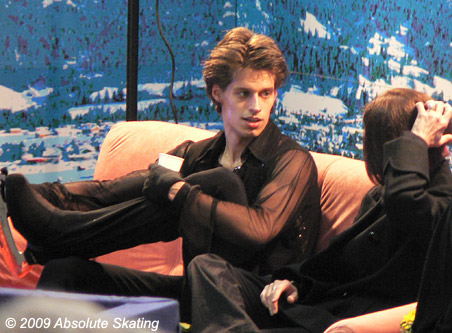
I told the Austrian federation I had to train for half a year so I could prove to myself that I could jump and be able to do a four and a half minute program. We worked all day long and it was really tough, all this happened in 2008. At 2009 I started competing again and it was interesting, because my jumps were fine but competing was really hard. The pre-season was OK, and the Nebelhorn Trophy... Well, the competitions weren't bad but not good either. At the last Europeans I didn't even make it to the final, I finished 29th.
Right, during the warm-up you landed everything but then at the actual competition it was like what is he doing?
I landed my jumps, but mentally it was so tough for me, I don't know why! I had no confidence. The two years when I didn't compete I lost so much confidence and the belief in myself. I didn't have it at all last season even though the jumps were better; I just didn't have enough confidence. This season is definitely a step up from that season. I'm starting to do more, but at the competitions I still don't show what I can do in practice. Maybe it looks like slow steps, but actually from that season to this season I've really moved forward and it's already much better. I'm starting to believe again and starting to gain back the confidence.
Have you considered getting help from a professional?
Yeah, I am already working with Christian Uhl. He is a very famous sports psychologist working with all the ski jumpers in Austria. But it all takes time. I was in a very bad position three years ago. I had some Canadian coaches come up to me at Worlds last year and there were people in general who said: "We know how hard it is what you are going through right now." Most people didn't really know, but some did. It was a really tough time and it was really nice that people supported me and said: "We are very proud to hear that you were able to come back."
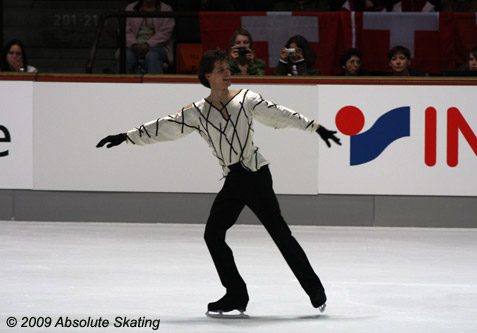
We are proud of you as well.
Now let's talk about this season's competitions: You did great at the Nebelhorn Trophy, placed second at the Ondrej Nepela and then dropped to 13th at the Ice Challenge in Graz. What happened there?
I trained really hard for the Nebelhorn because it was an Olympic qualifier, but then it went downhill. I trained really hard, I tried to improve things but at the Ice Challenge it fell apart. It was just a bad competition, but a week later I was able to skate better and at Nationals in December, I was very strong. The short program was good but then I got sick with a fever, so the long program was not that great.
And the rest of the season?
My training leading up to the Europeans was good and I was happy with the improvements. Things didn't go perfect because I lost a lot of points like on that doubled Lutz, but in general I was pretty happy with my performance in Tallinn. It was still not even close to where I wanted to be, but it was definitely getting better. And in the warm-up before the long program I landed a quad. It was two footed, but I landed it for the first time in the warm-up. I had landed one in the Liberty competition the summer before.
After the Europeans, I was happy with the way things went at the Olympics and the Worlds; it was my first 'real' season coming back and I was able to reach the goals I'd set. The Olympics were great because I was very happy with my performances and I enjoyed the Games so much. My coach Priscilla and I were excited to be there after a long journey and it was a very special moment for both of us.
Now after this successful season, I am optimistic and very motivated for the next few years. My training right now is going very well and I'm trying to set a great base for the next season...
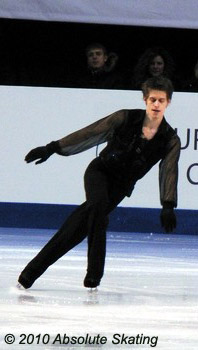
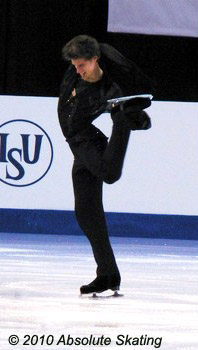
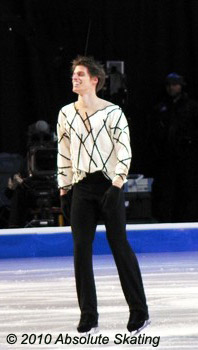
Talking about training: you always seem to use every minute of the practice. You are the last person to leave the ice and you are working on something to the very last moment.
I think in the two years I didn't skate, I got to appreciate everything a lot more. In my opinion I lost those two years, and now I have to make up for it. I'm 22, I'm not old, but I'm not 18 anymore and I can't afford to waste time; the time I have I really want to use. At home in Delaware I train only 3-4 hours in the morning and I have to use every minute of it, because in the afternoon I teach skating. I actually like teaching but then there are also my university classes. So my schedule is very, very tight.
You are a student too?
Yes, I study economics at the University of Delaware. So far I have earned 48 out of 120 credits, when you have 120 credits you can graduate. I am almost halfway there, but since my main focus is on skating I only take one or two courses per semester. That's not even half a load, so it's going to take maybe four or five more years. I could do it in two if I studied full time, but I don't want to.
Why did you choose economics?
Because eventually I'd like to become a corporate lawyer. I'm planning to skate until at least 2014, and after that maybe go to law school.
You mentioned in the previous interview that you know three languages and we must say that your English is just brilliant. Was it like that even before your move to America?
I don't think so. When I came to the States my biggest goal was to speak perfect English. People would always tell me "it's fine, you're fine" and I would be like "tell me how I can improve!", "In what way do you notice that I'm not American?" And people would answer "no no, you're fine, you're fine" but I wanted the language to be perfect so I worked really hard on it.
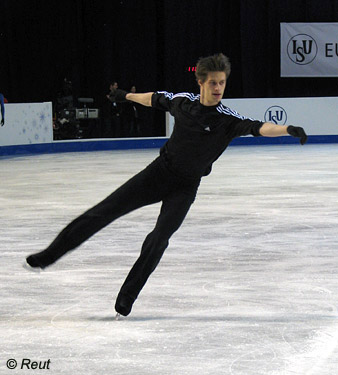
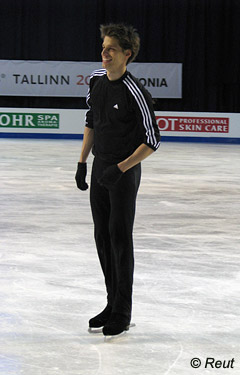
Back then you also planned to learn Russian. Did you? We ask because we speak RussianÂ…
My old coach - Elena - was Russian. She taught me some words and I was very interested in learning. But Priscilla is American and our rink doesn't have many Russians, so at the moment I'm more focused on work.
What about music, are you still playing the cello?
I have my cello in America; it's in Priscilla's basement as my apartment isn't big enough. But I barely get to play it. I have plans and I want to follow that direction and go through with those plans. Sometimes things change and occasionally I still play, but I don't think I will compose or play my own music anymore; I just don't have time for it.
But if you don't practice enough you'll forget everything!
On a high level this is true, and when I went to the conservatory I was on a high level. But I think with the cello – even if I don't play for a few years and then start again - I can re-learn it. I love music, but right now I don't have enough time.
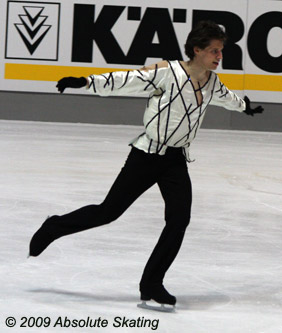 In the interview you mentioned that choosing the right music for your programs is important.
"Concierto de Aranjuez" by Joaquin Rodrigo works well for your long program, but it's hardly originalÂ…
In the interview you mentioned that choosing the right music for your programs is important.
"Concierto de Aranjuez" by Joaquin Rodrigo works well for your long program, but it's hardly originalÂ…
I've wanted to skate to it for many years. I used "Adagio" by Tomaso Albinoni last season and I really liked it, but I didn't want to keep that program because I improved so much and felt it didn't fit me anymore. Then I just fell in love with "Aranjuez" and decided to skate to it even though the music was very popular. But this season and maybe the next one I have to re-establish myself. I didn't expect to be in the top ten in the world yet; I have to get there step by step. I figured since I'm not quite there yet it's not really that important to create my own music, but rather to create my own program and my own style.
While teaching, do you also choreograph for your students?
I did some footwork for some kids but actually what I teach is very technical. Teaching is not my main interest, but sometimes my coach Priscilla asks me to help out with some of her students.
Looking through the interview from four years ago, you were asked "have you ever thought about quitting skating?" You said "no" then; would your answer be different now?
No. I had all the reasons to quit skating because I had nothing left - I had no money and no ice, nothing. But even then I really didn't think about quitting, I knew I would keep skating. The question I had to ask myself was: will I be able to believe in myself again and actually forgive myself for some mistakes I've made?
That's very important; to forgive yourself...
Exactly, and that was the hardest thing. Forgiving yourself and learning to believe in yourself again, those were two difficult issues.
Another question was "what keeps you motivated?" and you answered "improvement". What has helped you get through the hard times since then?
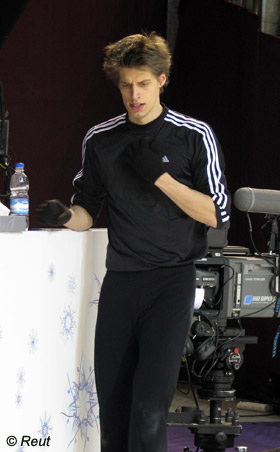 I always had a dream and never gave up on believing that I can actually get there. When you're young you have this "perfect life plan" and in the last three-four years I noticed that things can change very fast and you shouldn't take anything for granted. That's an important lesson I've learned.
I always had a dream and never gave up on believing that I can actually get there. When you're young you have this "perfect life plan" and in the last three-four years I noticed that things can change very fast and you shouldn't take anything for granted. That's an important lesson I've learned.
How will you plan things between now and Sochi?
Actually, I already have. The number one plan is no changes, because the team I have right now and the life I have works for me so I'll stick with it. The main thing for me is to put a triple Axel in my program. Not having one is keeping me from competing on a high level. I've been training it and it's getting a lot better. Now with the quad: last season it was cheated in every competition and I couldn't do it, but I tried it every time because I wanted to learn. This year they were clean but I usually fell, so my plan is to land them in the program next year. I think if I keep improving my stamina and speed, and keep working on the quad, and add a triple Axel, I won't have to think about the results.
Your style of skating is different from other European skaters, and though you train in the US you don't look like an American either.
That's very nice of you to say because I'm not trying to imitate anybody. That is even one of my biggest goals - to create my own look, but it's hard because I need to get stronger and more confident. I have had moments when I've succeed, but sometimes I didn't.
One last comparison to the previous interview: what are your strengths in skating? Four years ago you listed your coach, being an all-around-skater and your mind.
I think I can be very strong technically and doing the jumps correctly. Unfortunately this past season there were moments when I was completely off, but that's also a question of determination and confidence. I would call my individuality a strength and also my footwork. I hope to become stronger and have more stamina so I can actually perform full out because I am aware that sometimes I hold back on the footwork.
Thank you for the talk. You have a great attitude and we wish you good luck in the next season!



